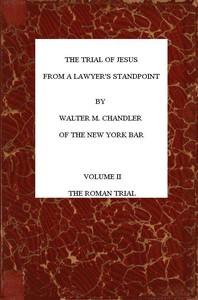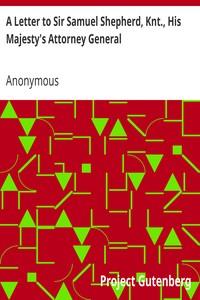Read this ebook for free! No credit card needed, absolutely nothing to pay.
Words: 87197 in 29 pages
This is an ebook sharing website. You can read the uploaded ebooks for free here. No credit cards needed, nothing to pay. If you want to own a digital copy of the ebook, or want to read offline with your favorite ebook-reader, then you can choose to buy and download the ebook.


: The Trial of Jesus from a Lawyer's Standpoint Vol. 2 (of 2) The Roman Trial by Chandler Walter M Walter Marion - Jesus Christ Trial; Trials (Blasphemy) Jerusalem; Trials (Treason) Jerusalem
ernor. In a cynical and sarcastic mood, Pilate turned to Jesus and asked: "What is truth?"
This pointed question was the legitimate offspring of the soul of Pilate and a natural product of the Roman civilization of his age. It was not asked with any real desire to know the truth; for he turned to leave the palace before an answer could be given. It was simply a blank response born of mental wretchedness and doubt. If prompted by any silent yearning for a knowledge of the truth, his conduct indicated clearly that he did not hope to have that longing satisfied by the words of the humble prisoner in his charge. "What is truth?" An instinctive utterance this, prompted by previous sad reflections upon the wrecks of philosophy in search of truth.
What did Pilate think of Jesus? He evidently regarded Him as an amiable enthusiast, a harmless religious fanatic from whom Caesar had nothing to fear. While alone with Jesus in the palace, he must have reasoned thus with himself, silently and contemptuously: The mob outside tells me that this man is Rome's enemy. Foolish thought! We know who Caesar's enemies are. We have seen and heard and felt the enemies of Rome--barbarians from beyond the Danube and the Rhine--great strong men, who can drive a javelin not only through a man, but a horse, as well. These are Caesar's enemies. This strange and melancholy man, whose subjects are mere abstract truths, and whose kingdom is beyond the skies, can be no enemy of Caesar.
Believing this, he went out to the rabble and pronounced a verdict of acquittal: "I find in him no fault at all."
Pilate had tried and acquitted Jesus. Why did he not release Him, and, if need be, protect Him with his cohort from the assaults of the Jews? Mankind has asked for nearly two thousand years why a Roman, with the blood of a Roman in him, with the glorious prestige and stern authority of the Roman empire at his back, with a Roman legion at his command, did not have the courage to do the high Roman act. Pilate was a moral and intellectual coward of arrant type. This is his proper characterization and a fitting answer to the world's eternal question.
The Jews heard his sentence of acquittal in sullen silence. Desperately resolved to prevent His release, they began at once to frame new accusations.
"And they were the more fierce, saying, He stirreth up the people, teaching throughout all Jewry, beginning from Galilee to this place."
This charge was intended by the Jews to serve a double purpose: to strengthen the general accusation of high treason recorded by St. Luke; and to embitter and poison the mind of the judge against the prisoner by telling Pilate that Jesus was from Galilee. In ancient times Galilee was noted as the hotbed of riot and sedition. The Galileans were brave and hardy mountaineers who feared neither Rome nor Judea. As champions of Jewish nationality, they were the fiercest opponents of Roman rule; and in the final catastrophe of Jewish history they were the last to be driven from the battlements of Jerusalem. As advocates and preservers of the purity of the primitive Jewish faith, they were relentless foes of Pharisaic and Sadducean hypocrisy as it was manifested by the Judean keepers of the Temple. The Galileans were hated, therefore, by both Romans and Judeans; and the Sanhedrists believed that Pilate would make short work of Jesus if he learned that the prisoner was from Galilee. But a different train of thought was excited in the mind of the Roman governor. He was thinking about one thing, and they about another. Pilate showed himself throughout the trial a craven coward and contemptible timeserver. From beginning to end, his conduct was a record of cowardice and subterfuge. He was constantly looking for loopholes of escape. His heart's desire was to satisfy at once both his conscience and the mob. The mention of Galilee was a ray of light that fell across the troubled path of the cowardly and vacillating judge. He believed that he saw an avenue of escape. He asked the Jews if Jesus was a Galilean. An affirmative reply was given. Pilate then determined to rid himself of responsibility by sending Jesus to be tried by the governor of the province to which He belonged. He felt that fortune favored his design; for Herod, Tetrarch of Galilee, was at that very moment in Jerusalem in attendance upon the Passover feast. He acted at once upon the happy idea; and, under the escort of a detachment of the Praetorian Cohort, Jesus was led away to the palace of the Maccabees where Herod was accustomed to stop when he came to the Holy City.
JESUS BEFORE HEROD
It was still early morning when Jesus, guarded by Roman soldiers and surrounded by a jeering, scoffing, raging multitude of Jews, was conducted to the palace of the Maccabees on the slope of Zion, the official residence of Herod when he came to Jerusalem to attend the sacred festivals. This place was to the northeast of the palace of Herod and only a few streets distant from it. The journey must have lasted therefore only a few minutes.
The son of a father who was ten times married and had murdered many of his wives; the murderer himself of John the Baptist; the slave of a lewd and wicked woman--what better could be expected than a cruel, crafty, worthless character, whose attributes were those of the fox?
But why was Jesus sent to Herod? Doubtless because Pilate wished to shift the responsibility from his own shoulders, as a Roman judge, to those of the Galilean Tetrarch. A subsidiary purpose may have been to conciliate Herod, with whom, history says, he had had a quarrel. The cause of the trouble between them is not known. Many believe that the murder of the Galileans while sacrificing in the Temple was the origin of the unpleasantness. Others contend that this occurrence was the result and not the cause of the quarrel between Pilate and Herod. Still others believe that the question of the occupancy of the magnificent palace of Herod engendered ill feeling between the rival potentates. Herod had all the love of gorgeous architecture and luxurious living that characterized the whole Herodian family. And, besides, he doubtless felt that he should be permitted to occupy the palace of his ancestors on the occasion of his visits to Jerusalem. But Pilate would naturally object to this, as he was the representative of almighty Rome in a conquered province and could not afford to give way, in a matter of palatial residence, to a petty local prince. But, whatever the cause, the unfriendliness between them undoubtedly had much to do with the transfer of Jesus from the Praetorium to the palace of the Maccabees.
Free books android app tbrJar TBR JAR Read Free books online gutenberg
More posts by @FreeBooks

: The Trial of Jesus from a Lawyer's Standpoint Vol. 1 (of 2) The Hebrew Trial by Chandler Walter M Walter Marion - Jesus Christ Trial; Trials (Blasphemy) Jerusalem; Trials (Treason) Jerusalem


: Time and the Woman by Dewey G Gordon - Science fiction; Short stories; Women Fiction; Space travelers Fiction






